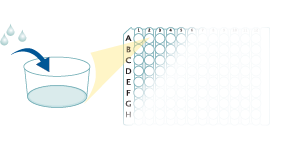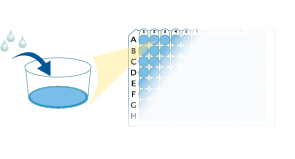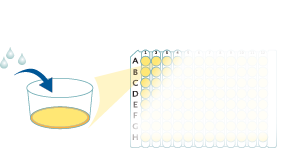Mouse GM-CSF Quantikine ELISA Kit Summary
Product Summary
Precision
Cell Culture Supernates, Serum, Plasma
| Intra-Assay Precision | Inter-Assay Precision | |||||
|---|---|---|---|---|---|---|
| Sample | 1 | 2 | 3 | 1 | 2 | 3 |
| n | 20 | 20 | 20 | 20 | 20 | 20 |
| Mean (pg/mL) | 18.5 | 67.2 | 219 | 20 | 71.7 | 243 |
| Standard Deviation | 0.7 | 2.1 | 6.9 | 1 | 3.8 | 11.2 |
| CV% | 3.8 | 3.1 | 3.2 | 5 | 5.3 | 4.6 |
Recovery
The recovery of mouse GM-CSF spiked to three levels throughout the range of the assay in various matrices was evaluated.
| Sample Type | Average % Recovery | Range % |
|---|---|---|
| Cell Culture Supernates (n=8) | 96 | 82-114 |
| Serum (n=7) | 94 | 82-112 |
Linearity
Scientific Data
Product Datasheets
Preparation and Storage
Background: GM-CSF
GM-CSF (Granulocyte-Macrophage Colony Stimulating Factor) induces the development of monocytes, neutrophils, eosinophils, and myeloid and dermal dendritic cells. It also acts as a neutrophil and dendritic cell chemoattractant. GM-CSF promotes Th1 and Th17 cell mediated autoimmune inflammation as well as the inflammatory activation of dendritic cells, microglia, alveolar macrophages, and eosinophils. In addition, it cooperates with G-CSF in promoting tumor cell proliferation and invasion. GM-CSF signals through a receptor complex composed of GM-CSF R alpha and the Common beta Chain (beta c) with Syndecan-2 as a potential co-receptor. The beta c subunit is shared by the receptor complexes for IL-3 and IL-5.
Assay Procedure
Refer to the product- Prepare all reagents, standard dilutions, and samples as directed in the product insert.
- Remove excess microplate strips from the plate frame, return them to the foil pouch containing the desiccant pack, and reseal.
- Add 50 µL of Assay Diluent to each well.
- Add 50 µL of Standard, Control, or sample to each well. Cover with a plate sealer, and incubate at room temperature for 2 hours.
- Aspirate each well and wash, repeating the process 4 times for a total of 5 washes.
- Add 100 µL of Conjugate to each well. Cover with a new plate sealer, and incubate at room temperature for 2 hours.
- Aspirate and wash 5 times.
- Add 100 µL Substrate Solution to each well. Incubate at room temperature for 30 minutes. PROTECT FROM LIGHT.
- Add 100 µL of Stop Solution to each well. Read at 450 nm within 30 minutes. Set wavelength correction to 540 nm or 570 nm.





Citations for Mouse GM-CSF Quantikine ELISA Kit
R&D Systems personnel manually curate a database that contains references using R&D Systems products. The data collected includes not only links to publications in PubMed, but also provides information about sample types, species, and experimental conditions.
39
Citations: Showing 1 - 10
Filter your results:
Filter by:
-
Cerebrospinal fluid markers of neuroinflammation and coagulation in severe cerebral edema and chronic hydrocephalus after subarachnoid hemorrhage: a prospective study
Authors: Fang, Y;Liu, Y;Chen, L;Wang, J;Zhang, J;Zhang, H;Tian, S;Zhang, A;Zhang, J;Zhang, JH;Wang, X;Yu, J;Chen, S;
Journal of neuroinflammation
Species: Mouse
Sample Types: Tissue Homogenates
-
CSF1R Ligands Expressed by Murine Gliomas Promote M-MDSCs to Suppress CD8+ T Cells in a NOS-Dependent Manner
Authors: Takacs, GP;Garcia, JS;Hodges, CA;Kreiger, CJ;Sherman, A;Harrison, JK;
Cancers
Species: Mouse
Sample Types: Cell Culture Supernates
-
Glioma-derived M-CSF and IL-34 license M-MDSCs to suppress CD8+ T cells in a NOS-dependent manner
Authors: Takacs, GP;Garcia, JS;Hodges, CA;Kreiger, CJ;Sherman, A;Harrison, JK;
bioRxiv : the preprint server for biology
Species: Mouse
Sample Types: Cell Culture Supernates
-
Circadian clocks guide dendritic cells into skin lymphatics
Authors: SJ Holtkamp, LM Ince, C Barnoud, MT Schmitt, F Sinturel, V Pilorz, R Pick, S Jemelin, M Mühlstädt, WH Boehncke, J Weber, D Laubender, J Philippou-, CS Chen, L Holtermann, D Vestweber, M Sperandio, BU Schraml, C Halin, C Dibner, H Oster, J Renkawitz, C Scheierman
Nature Immunology, 2021-10-18;22(11):1375-1381.
Species: Mouse
Sample Types: Cell Culture Supernates
-
Aging and neuroinflammation: Changes in immune cell responses, axon integrity, and motor function in a viral model of progressive multiple sclerosis
Authors: L Mestre, G Alonso, A Feliú, M Mecha, C Martín, LM Villar, C Guaza
Aging Cell, 2021-08-06;0(0):e13440.
Species: Mouse
Sample Types: Cell Culture Supernates
-
Effects of protein malnutrition on haematopoietic regulatory activity of bone marrow mesenchymal stem cells
Authors: AA Hastreiter, GG Dos Santos, EN Makiyama, EWC Santos, P Borelli, RA Fock
The Journal of nutritional biochemistry, 2021-03-08;0(0):108626.
Species: Mouse
Sample Types: Cell Culture Supernates
-
A New Mouse Model of Chronic Myocarditis Induced by Recombinant Bacille Calmette-Gu�rin Expressing a T-Cell Epitope of Cardiac Myosin Heavy Chain-&alpha
Authors: K Tajiri, K Imanaka-Yo, Y Tsujimura, K Matsuo, M Hiroe, K Aonuma, M Ieda, Y Yasutomi
International Journal of Molecular Sciences, 2021-01-14;22(2):.
Species: Mouse
Sample Types: Tissue Homogenates
-
Enhanced Intestinal Immune Response in Mice after Oral Administration of Korea Red Ginseng-Derived Polysaccharide
Authors: DH Park, B Han, MS Shin, GS Hwang
Polymers, 2020-09-24;12(10):.
Species: Mouse
Sample Types: Cell Culture Supernates
-
Selective inhibition of mTORC1 in tumor vessels increases antitumor immunity
Authors: S Wang, A Raybuck, E Shiuan, SH Cho, Q Wang, DM Brantley-S, D Edwards, MM Allaman, J Nathan, KT Wilson, D DeNardo, S Zhang, R Cook, M Boothby, J Chen
JCI Insight, 2020-08-06;5(15):.
Species: Mouse
Sample Types: Tissue Homogenates
-
Microglial Homeostasis Requires Balanced CSF-1/CSF-2 Receptor Signaling
Authors: V Chitu, F Biundo, GGL Shlager, ES Park, P Wang, ME Gulinello, ? Gokhan, HC Ketchum, K Saha, MA DeTure, DW Dickson, ZK Wszolek, D Zheng, AL Croxford, B Becher, D Sun, MF Mehler, ER Stanley
Cell Rep, 2020-03-03;30(9):3004-3019.e5.
Species: Mouse
Sample Types: Tissue Homogenates
-
Effective hematopoietic stem cell-based gene therapy in a murine model of hereditary pulmonary alveolar proteinosis
Authors: M Hetzel, E Lopez-Rodr, A Mucci, AHH Nguyen, T Suzuki, K Shima, T Buchegger, S Dettmer, T Rodt, JP Bankstahl, P Malik, L Knudsen, A Schambach, G Hansen, BC Trapnell, N Lachmann, T Moritz
Haematologica, 2019-07-09;105(4):1147-1157.
Species: Mouse
Sample Types: Bronchoalveolar lavage fluid
-
FGL2 promotes tumor progression in the CNS by suppressing CD103+ dendritic cell differentiation
Authors: J Yan, Q Zhao, K Gabrusiewi, LY Kong, X Xia, J Wang, M Ott, J Xu, RE Davis, L Huo, G Rao, SC Sun, SS Watowich, AB Heimberger, S Li
Nat Commun, 2019-01-25;10(1):448.
Species: Mouse
Sample Types: Cell Culture Supernates
-
Arming oncolytic reovirus with GM-CSF gene to enhance immunity
Authors: V Kemp, DJM van den Wo, MGM Camps, T van Hall, P Kinderman, N Pronk-van, RC Hoeben
Cancer Gene Ther., 2018-11-23;0(0):.
-
Calf Spleen Extractive Injection protects mice against cyclophosphamide-induced hematopoietic injury through G-CSF-mediated JAK2/STAT3 signaling
Authors: W Lu, D Jia, S An, M Mu, X Qiao, Y Liu, X Li, D Wang
Sci Rep, 2017-08-21;7(1):8402.
Species: Mouse
Sample Types: Plasma
-
Adipose progenitor cell secretion of GM-CSF and MMP9 promotes a stromal and immunological microenvironment that supports breast cancer progression
Authors: F Reggiani, V Labanca, P Mancuso, C Rabascio, G Talarico, S Orecchioni, A Manconi, F Bertolini
Cancer Res., 2017-07-28;0(0):.
Species: Mouse
Sample Types: Cell Culture Supernates
-
A heart-brain-kidney network controls adaptation to cardiac stress through tissue macrophage activation
Authors: K Fujiu, M Shibata, Y Nakayama, F Ogata, S Matsumoto, K Noshita, S Iwami, S Nakae, I Komuro, R Nagai, I Manabe
Nat. Med., 2017-04-10;23(5):611-622.
Species: Mouse
Sample Types: Serum
-
Modifying Antigen-Encapsulating Liposomes with KALA Facilitates MHC Class I Antigen Presentation and Enhances Anti-tumor Effects
Authors: N Miura, H Akita, N Tateshita, T Nakamura, H Harashima
Mol. Ther, 2017-02-22;0(0):.
Species: Mouse
Sample Types: Serum
-
Development and Preclinical Application of an Immunocompetent Transplant Model of Basal Breast Cancer with Lung, Liver and Brain Metastases
PLoS ONE, 2016-05-12;11(5):e0155262.
Species: Mouse
Sample Types:
-
Cardiac fibroblasts mediate IL-17A-driven inflammatory dilated cardiomyopathy.
Authors: Wu L, Ong S, Talor M, Barin J, Baldeviano G, Kass D, Bedja D, Zhang H, Sheikh A, Margolick J, Iwakura Y, Rose N, Cihakova D
J Exp Med, 2014-06-16;211(7):1449-64.
Species: Mouse
Sample Types: Cell Culture Supernates
-
Key role of microRNA in the regulation of granulocyte macrophage colony-stimulating factor expression in murine alveolar epithelial cells during oxidative stress.
Authors: Sturrock, Anne, Mir-Kasimov, Mustafa, Baker, Jessica, Rowley, Jesse, Paine, Robert 3
J Biol Chem, 2013-12-26;289(7):4095-105.
Species: Mouse
Sample Types: Cell Culture Supernates
-
Oncolytic viral therapy with a combination of HF10, a herpes simplex virus type 1 variant and granulocyte-macrophage colony-stimulating factor for murine ovarian cancer.
Authors: Goshima F, Esaki S, Luo C, Kamakura M, Kimura H, Nishiyama Y
Int J Cancer, 2013-12-02;134(12):2865-77.
Species: Mouse
Sample Types: Cell Culture Supernates
-
Protein malnutrition induces bone marrow mesenchymal stem cells commitment to adipogenic differentiation leading to hematopoietic failure.
Authors: Cunha M, Lima F, Vinolo M, Hastreiter A, Curi R, Borelli P, Fock R
PLoS ONE, 2013-03-14;8(3):e58872.
Species: Mouse
Sample Types: Cell Culture Supernates
-
Histone Deacetylase Inhibitor LAQ824 Augments Inflammatory Responses in Macrophages through Transcriptional Regulation of IL-10.
Authors: Wang H, Cheng F
J. Immunol., 2011-03-02;186(0):3986.
Species: Mouse
Sample Types: Cell Culture Supernates
-
Keratinocyte Growth Factor Augments Pulmonary Innate Immunity through Epithelium-driven, GM-CSF-dependent Paracrine Activation of Alveolar Macrophages.
Authors: Wu H, Suzuki T, Carey B, Trapnell BC, McCormack FX
J. Biol. Chem., 2011-02-22;286(17):14932-40.
Species: Mouse
Sample Types: Tissue Homogenates
-
Deletion of tristetraprolin caused spontaneous reactive granulopoiesis by a non-cell-autonomous mechanism without disturbing long-term hematopoietic stem cell quiescence.
Authors: Kaplan IM, Morisot S, Heiser D, Cheng WC, Kim MJ, Civin CI
J. Immunol., 2011-01-26;186(5):2826-34.
Species: Mouse
Sample Types: Plasma
-
Bcl3 prevents acute inflammatory lung injury in mice by restraining emergency granulopoiesis.
Authors: Kreisel D, Sugimoto S, Tietjens J, Zhu J, Yamamoto S, Krupnick AS, Carmody RJ, Gelman AE
J. Clin. Invest., 2010-12-13;121(1):265-76.
Species: Mouse
Sample Types: Serum
-
Macrophage tumor necrosis factor-alpha induces epithelial expression of granulocyte-macrophage colony-stimulating factor: impact on alveolar epithelial repair.
Authors: Cakarova L, Marsh LM, Wilhelm J, Mayer K, Grimminger F, Seeger W, Lohmeyer J, Herold S
Am. J. Respir. Crit. Care Med., 2009-07-09;180(6):521-32.
Species: Mouse
Sample Types: Cell Culture Supernates
-
Novel immunocompetent murine tumor model for evaluation of conditionally replication-competent (oncolytic) murine adenoviral vectors.
Authors: Robinson M, Li B, Ge Y, Ko D, Yendluri S, Harding T, VanRoey M, Spindler KR, Jooss K
J. Virol., 2009-02-04;83(8):3450-62.
Species: Mouse
Sample Types: Tissue Homogenates
-
Simultaneous absence of surfactant proteins A and D increases lung inflammation and injury after allogeneic HSCT in mice.
Authors: Gram K, Yang S, Steiner M, Somani A, Hawgood S, Blazar BR, Panoskaltsis-Mortari A, Haddad IY
Am. J. Physiol. Lung Cell Mol. Physiol., 2008-11-07;296(2):L167-75.
Species: Mouse
Sample Types: BALF
-
Administration of cyclooxygenase-2 inhibitor reduces joint inflammation but exacerbates osteopenia in IL-1 alpha transgenic mice due to GM-CSF overproduction.
Authors: Niki Y, Takaishi H, Takito J, Miyamoto T, Kosaki N, Matsumoto H, Toyama Y, Tada N
J. Immunol., 2007-07-01;179(1):639-46.
Species: Mouse
Sample Types: Cell Culture Supernates
-
Lentiviral vector-mediated autonomous differentiation of mouse bone marrow cells into immunologically potent dendritic cell vaccines.
Authors: Koya RC, Kimura T, Ribas A, Rozengurt N, Lawson GW, Faure-Kumar E, Wang HJ, Herschman H, Kasahara N, Stripecke R
Mol. Ther., 2007-03-20;15(5):971-80.
Species: Mouse
Sample Types: Serum
-
IL-7 induces myelopoiesis and erythropoiesis.
Authors: Aiello FB, Keller JR, Klarmann KD, Dranoff G, Mazzucchelli R, Durum SK
J. Immunol., 2007-02-01;178(3):1553-63.
Species: Mouse
Sample Types: Cell Culture Supernates
-
GM-CSF and the impaired pulmonary innate immune response following hyperoxic stress.
Authors: Baleeiro CE, Christensen PJ, Morris SB, Mendez MP, Wilcoxen SE, Paine R
Am. J. Physiol. Lung Cell Mol. Physiol., 2006-08-04;291(6):L1246-55.
Species: Mouse
Sample Types: Tissue Homogenates
-
Expression of CCL20 and granulocyte-macrophage colony-stimulating factor, but not Flt3-L, from modified vaccinia virus ankara enhances antiviral cellular and humoral immune responses.
Authors: Chavan R, Marfatia KA, An IC, Garber DA, Feinberg MB
J. Virol., 2006-08-01;80(15):7676-87.
Species: Mouse
Sample Types: Cell Culture Supernates
-
Organ-specific role of MyD88 for gene regulation during polymicrobial peritonitis.
Authors: Weighardt H, Mages J, Jusek G, Kaiser-Moore S, Lang R, Holzmann B
Infect. Immun., 2006-06-01;74(6):3618-32.
Species: Mouse
Sample Types: Tissue Homogenates
-
A novel polysaccharide of black soybean promotes myelopoiesis and reconstitutes bone marrow after 5-flurouracil- and irradiation-induced myelosuppression.
Authors: Liao HF, Chen YJ, Yang YC
Life Sci., 2005-02-25;77(4):400-13.
Species: Mouse
Sample Types: Cell Culture Supernates
-
Endogenous granulocyte-macrophage colony-stimulating factor overexpression in vivo results in the long-term recruitment of a distinct dendritic cell population with enhanced immunostimulatory function.
Authors: Miller G, 107331, Pillarisetty VG, Shah AB, Lahrs S, Xing Z, DeMatteo RP
Lamin A/C impairments cause mitochondrial dysfunction by attenuating PGC1alpha and the NAMPT-NAD+ pathway, 2002-09-15;169(6):2875-85.
Species: Mouse
Sample Types: Serum
-
Interleukin 3 and granulocyte-macrophage colony-stimulating factor are not required for induction of chronic myeloid leukemia-like myeloproliferative disease in mice by BCR/ABL.
Authors: Li S, Gillessen S, Tomasson MH, Dranoff G, Gilliland DG, Van Etten RA
Blood, 2001-03-01;97(5):1442-50.
Species: Mouse
Sample Types: Serum
-
A secreted and LIF-mediated stromal cell-derived activity that promotes ex vivo expansion of human hematopoietic stem cells.
Authors: Shih CC, Hu MC, Hu J
Blood, 2000-03-15;95(6):1957-66.
Species: Mouse
Sample Types: Cell Culture Supernates
FAQs
No product specific FAQs exist for this product, however you may
View all ELISA FAQsReviews for Mouse GM-CSF Quantikine ELISA Kit
Average Rating: 4.5 (Based on 2 Reviews)
Have you used Mouse GM-CSF Quantikine ELISA Kit?
Submit a review and receive an Amazon gift card.
$25/€18/£15/$25CAN/¥75 Yuan/¥2500 Yen for a review with an image
$10/€7/£6/$10 CAD/¥70 Yuan/¥1110 Yen for a review without an image
Filter by:







